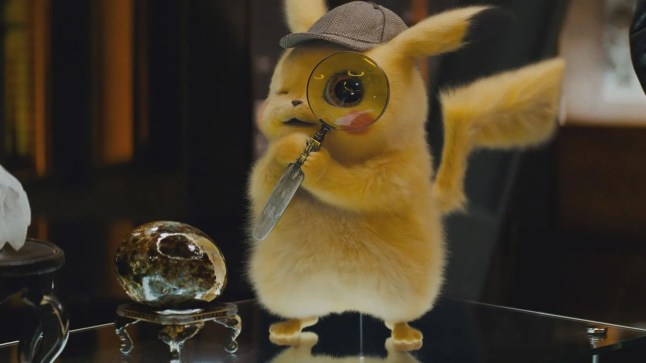
A new US patent has given Nintendo the exclusive ability to summon characters to fight for you in a video game and it doesn’t just apply to Pokémon.
The ability to patent gameplay mechanics has always seemed absurd to ordinary gamers but while what is and isn’t allowed often seems arbitrary, especially in the US, it is something that happens – forcing developers to find workarounds or just avoid some gameplay mechanics entirely.
The most famous example is probably the Nemesis system from Middle-Earth: Shadow Of Mordor and its sequel, which now that developer Monolith Productions has been shut down may never see the light of day again. But there are many others, from the Ping system in Apex Legends to the dialogue wheel from BioWare’s Mass Effect.
Nintendo also have many patents (including one for their original D-pad, which is why everyone else’s looks different) but the one they’ve just been granted in the US could have a serious, negative effect on games from other developers.
Publishers will always try their luck with a patent, just to see if it’s granted, but in this case Nintendo is purposefully trying to shore up its legal case against blatant Pokémon clone Palworld, from Japanese developer Pocketpair.
What is the Nintendo summons patent?
That’s led to it registering a lot of new Pokémon related patents lately and the most recent to be granted, without an objection from the US patent office, covers ‘summoning a character and letting it fight another.’
Expert, exclusive gaming analysis
Sign up to the GameCentral newsletter for a unique take on the week in gaming, alongside the latest reviews and more. Delivered to your inbox every Saturday morning.
In the context of Pokémon that means that only Nintendo can allow the main player character to summon another ‘sub-character’ and have them fight for them. That immediately rules out any other Pokémon-like game from using a similar system, from newer indie titles like Temtem and Cassette Beasts to long-standing rivals like Digimon.
However, the description is broad enough that it technically includes any game with summoning in it, which is a very common mechanic in Japanese role-players in particular. Indeed, the original Pokémon games were themselves, in most respects, just standard turn-based role-players.
The patent doesn’t mean any game immediately becomes illegal, as Pokémon would have to prove in court that the patent had been infringed.
As everyone knows, Nintendo has very capable lawyers, but it won’t want to spend time and money chasing after every role-playing game just because it can – not least because that would involve ruining their relationship with publishers and developers that are normally allies and partners.
They’ll definitely go after Pocketpair though – who have already changed aspects of Palword to placate Nintendo – and may well take on direct Pokémon clones like Temtem, especially since indie developers won’t be able to afford much in the way of lawyers and the patent is very explicit.
Why was the Nintendo summons patent granted?
Given how much Nintendo likes suing people, the situation not only threatens existing games but will discourage developers from including similar mechanics in new titles.
Talking to PC Gamer, video game patent lawyer Kirk Sigmon described the situation – and Nintendo’s recent spate of anti-Palworld patents – as ‘an embarrassing failure of the US patent system’.
According to him, the patent represents, ‘procedural irregularities in the decision-making of US patent officials. And thanks to those irregularities, Nintendo has yet more tools to bully its competitors.’
‘I have no earthly idea how the examiner could, in good faith, allow this application so quickly, added Sigmon. ‘None of the three patents I’ve discussed here should have been allowed. It’s shocking and offensive that they were.’
Again, this isn’t unique to Nintendo. Although this patent went uncontested by the US patent office another recent one, about riding and flying mounts, was queried. But only because Xbox and Tencent already had a similar patent.
The summons one is especially worrying though, because the concept of a summons, in the more general sense, predates Pokémon and is a widely used concept by many companies in the industry.
No one’s going to relish the idea of having to prove that in court though, especially since video games are so poorly understood by those outside the industry – as evidenced by the fact that Nintendo’s summons patent was granted in the first place.

Email gamecentral@metro.co.uk, leave a comment below, follow us on Twitter.
To submit Inbox letters and Reader’s Features more easily, without the need to send an email, just use our Submit Stuff page here.
For more stories like this, check our Gaming page.




This post raises some interesting points about the implications of the new Nintendo Pokémon patent. It’s always concerning when patents might stifle creativity in the gaming industry. It’ll be interesting to see how this develops and affects other game creators.
Absolutely, the potential for increased litigation could significantly impact not just game developers but also innovation in the industry. It raises questions about how far intellectual property rights should extend, especially in a creative field like gaming.
I agree, and it’s concerning how this could create a chilling effect for indie developers as well. Many smaller studios might hesitate to innovate for fear of legal repercussions. It’s a tricky balance between protecting intellectual property and fostering creativity in the gaming industry.
Absolutely, the impact on indie developers could be significant. It’s troubling to think that this patent might stifle creativity and innovation in the gaming industry, especially for smaller studios trying to bring fresh ideas to life.
You’re right; the potential repercussions for indie developers are concerning. It’s disheartening to see how such patents might stifle creativity and innovation in the gaming industry. Hopefully, there will be discussions around fair practices to protect smaller creators.
see how patents can stifle creativity in the gaming industry. Indie developers often rely on unique ideas to stand out, and this kind of legal action could really limit their innovation. It’ll be interesting to see how the community responds and if there will be any pushback against such practices.
You make a great point about indie developers! It’s concerning how patents can limit their ability to innovate. It would be interesting to see how this might push more developers to explore alternative gaming formats or platforms to avoid legal issues.
I completely agree! Patents can indeed stifle creativity in the indie scene. It’s interesting to think about how this could also impact collaboration between developers, as many rely on sharing ideas to innovate.
I completely agree! Patents can indeed stifle creativity in the indie scene. It’s interesting to think about how this could lead to a chilling effect on game development, as smaller studios might hesitate to innovate for fear of legal repercussions. Balancing protection and creativity is definitely a challenge in the industry.
I completely agree! Patents can indeed stifle creativity in the indie scene. It’s interesting to think about how this could lead to a chilling effect, where smaller developers might hesitate to innovate for fear of legal repercussions. Balancing protection and creativity is definitely a challenge!
It’s interesting to think about how this could impact not just indie developers but also larger studios that want to innovate. If companies like Nintendo become more aggressive with their patents, it might deter collaboration and shared ideas, which are crucial for the gaming community’s growth.
Absolutely, it’s a significant concern for the entire gaming industry. Larger studios might be more equipped to handle legal battles, but the chilling effect on creativity could stifle innovation across the board. It’s crucial for developers of all sizes to advocate for fair use and find ways to collaborate rather than clash.
I agree, larger studios do have the resources to navigate these legal challenges, but it’s the smaller developers who might really suffer. This patent could stifle creativity and innovation, leading to fewer unique games in the market. It’s a tricky situation that could affect the diversity of gaming experiences we enjoy.
I understand your concern about smaller studios facing these legal hurdles. It’s worth noting that such patents can stifle creativity and innovation in the gaming industry, making it harder for indie developers to bring fresh ideas to life. Balancing intellectual property rights with fostering new talent is crucial for the future of gaming.
I understand your concern about smaller studios facing these legal hurdles. It’s worth noting that this patent could also stifle innovation, as developers might hesitate to create new content for fear of legal repercussions. Finding a balance between protecting IP and encouraging creativity is crucial for the gaming industry.
I understand your concern about smaller studios facing these legal hurdles. It’s worth noting that this patent could also stifle creativity in game development, as developers may hesitate to innovate for fear of legal repercussions. Balancing protection and innovation is crucial for the gaming industry’s growth.
I understand your concern about smaller studios facing these legal hurdles. It’s worth noting that this patent could also impact the creative freedom of developers, potentially stifling innovation in the gaming industry. Balancing intellectual property rights with fostering creativity is definitely a challenge.
I appreciate your point about smaller studios. It’s concerning how patents like this can stifle creativity and innovation in the gaming industry. Many indie developers rely on unique concepts, and this could discourage them from taking risks.
I completely agree with you. It’s really worrying how such patents can create a barrier for innovation, especially for indie developers trying to carve out their niche. It will be interesting to see if there are any movements toward reforming patent laws to better protect creativity in the gaming industry.
Absolutely, it’s concerning how patents can stifle creativity in the gaming industry. It’s worth noting that while patents are meant to protect innovation, they can sometimes lead to an environment where smaller developers feel too intimidated to create new content. This could ultimately limit the diversity of games we see in the market.
noting that this could also lead to a chilling effect on indie developers who rely on innovation. The potential for legal action might discourage them from experimenting with new ideas, which is essential for the growth of the gaming landscape.
You’re absolutely right about the impact on indie developers. It’s concerning that such patents might stifle creativity and limit unique game concepts. Innovation thrives on freedom, and this could set a precedent that discourages new ideas in the gaming industry.